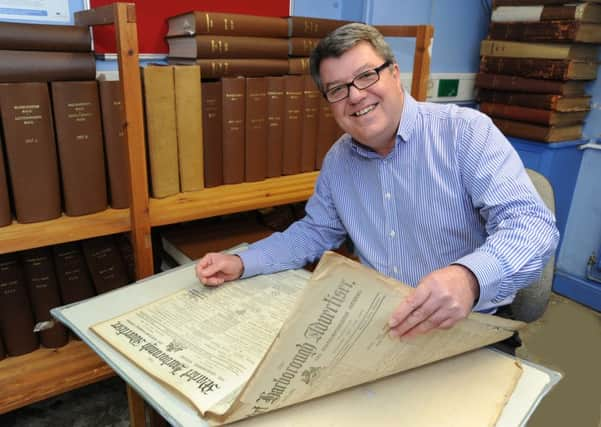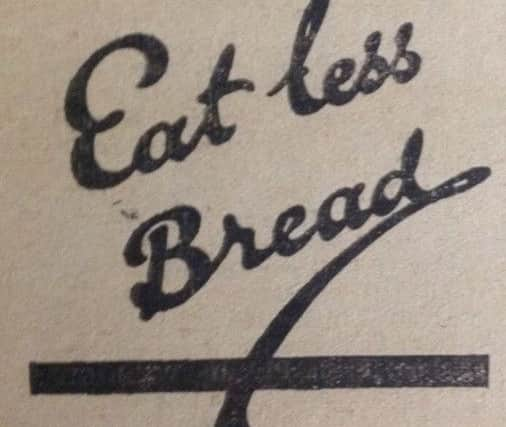JOHN DILLEY'S WWI BLOG: Winning the war on food


The battle to forestall official rationing on the home front is effectively communicated to readers of the June 12, 1917, edition of the Market Harborough Advertiser.
Simple ‘Eat less bread’ advertisements are placed strategically on two of the four pages of this issue for the first time – even though there are no editorial stories explaining why it is such an important exhortation from the government.
Advertisement
Advertisement
National newspapers, however, are full of the issues surrounding food shortages being caused by the lack of imported wheat to make bread.


The Daily Telegraph publishes a letter from the Lord of Mayor of London who sums up the issue succinctly. “Germany has resorted to wholesale piracy and is sinking ships on sight in order to starve us out.
“The danger is real and urgent but we civilians can mitigate the effects of that which cannot prevent – provided every one of us eats a little less than usual.”
Although the problem wasn’t just down to enemy action – poor harvests and decreased manpower due to workforces being siphoned off by the military – the Minister for Food was warning the Cabinet that feeding the country after September 1917 would be ‘a difficult problem’.
Advertisement
Advertisement
Apart from the campaign launched in newspapers across the country including the Advertiser, the government launched a propaganda campaign encouraging bakers and housewives to use potatoes to bulk out their loaves and commanded that commercial bakers could only use ‘standard flour’, a mix that contained more of the grain that, during peacetime, would usually be discarded.


As a further measure, the Ministry of Food and wider government made attempts to influence consumption, as well as production, by introducing the Bread Order. This regulation made it illegal to sell bread until 12 hours after it had been baked. According to The Times, the government realised that stale bread was ‘more nutritious’ and would be consumed 5 per cent less than fresh bread.
Meanwhile, the death toll of local young men continues to mount and there are poignant stories to tell with each of them.
Readers are not told how Private Harry Cole of Gumley died but there is a sincere message in a letter from one of his comrades.
Advertisement
Advertisement
Corporal Thomas Dow says to Cole’s mother: “It may be a source of comfort to you to know that he was buried just behind our lines, as so many poor lads do not get buried at all.
“The parcel you sent for him was shared amongst his pals according to the custom of the Battalion as otherwise they only get burned.”
The story adds that Cole was ‘a very popular young man in Gumley and a prominent member of the Gumley Cricket Club’.
There is also some crumbs of comfort offered to a family from Logan Street, Market Harborough, when they are told of the death of their son Private J Moran.
Advertisement
Advertisement
Moran’s officer says in a letter to the family that ‘he was killed instantaneously and suffered no pain’ and a comrade also writes: “He was in the reserve billets when a shell struck the building, instantly killing him and wounding a lot more.”
The Advertiser concludes its report by saying: “Much sympathy will be felt with the relatives especially as [his father] Mr Moran senior met with a bad accident on May 7 th and is still unable to get up.”
It is not just young, single men who are paying the ultimate price for their King and country. Private John Thompson of West Langton, who has died of his wounds, leaves a wife and four young children.
And a veteran of the Boer War, Private Gerald De Legh, who worked as a clerk at the London City and Midland Bank in Market Harborough, was killed by a single stray bullet while on sentry duty at the front. The Advertiser’s report says: “He was determined to go through the war as a private, and more than once declined a commission offered to him or even NCOs stripes.”
Advertisement
Advertisement
Sad news also for the mother of Lance Corporal Robert Grewcock - her son has had both legs amputated below the knees after being severely wounded in both legs.
There is good news to report too. Lieutenant Wallis Coales of Burnmill Road, Market Harborough, has received the Military Medal – and it was presented to him in Hyde Park by no less than the King; Second Lieutenant W T Manning of Harcourt Street has been gazetted to the Machine Gun Corps; Lieutenant Bert Durrard of Market Harborough, who used to work at the Rubber Company, has been promoted to captain; and Second Lieutenant W Harris of St Mary’s Road has officially been listed as a prisoner of war – previously his family had been told he was thought to be ‘missing probably wounded’.